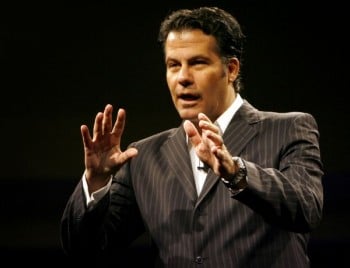
In a new article in The American Prospect, Alec MacGillis attempts a brutal takedown of Richard Florida (right) for his apparent flip-flop on urban revitalization. In 2002, Florida penned The Rise of the Creative Class, in which he argued that cities’ economic vitality in the 21st century depends in large part on their ability to attract what he dubbed the “Creative Class”: a somewhat amorphous group that includes everyone from bankers to college professors, engineers to artists and musicians.
More recently, in the March 2009 issue of The Atlantic, and in his upcoming book The Great Reset, Florida has been arguing that some cities and metropolitan regions are basically totaled; it is not worth our resources to try and fix them.
MacGillis quotes Florida: “We can confer subsidies on places to improve their infrastructure, universities, and core institutions, or quality of life, [but] at the end of the day, people — not industries or even places — should be our biggest concern. We can best help those who are hardest-hit by the crisis, by providing a generous social safety [net], investing in their skills, and when necessary helping them become more mobile and move to where the opportunities are.”
Pointing to Florida’s change in tone, coupled with the fact that Florida had a rather lucrative lecture circuit where he explained his Creative Class theory as an economic development strategy for $35,000 a pop, MacGillis paints the Professor to be some sort of urban planning snake-oil salesman. And not without reason; MacGillis points out both Florida’s partnership with Catalytix, a consulting group that charges $250K for reports that “differ little city to city”, and his side-firm, the Creative Class Leadership Program, “that guides cities through year-long planning initiatives for which Florida himself does not necessarily appear in person.” Neither make him seem to be the disinterested academic he really ought to be.
What it reminded me of most, sadly, was the episode of The Simpsons, in which Springfield gets a monorail. I don’t think this is the silliest comparison, perhaps because I had an urban planning professor in college who once gave an excellent lecture trying to answer the 20-year-old question of where Springfield is located, based on its economy, politics, and urban layout. Turns out, it’s a Sunbelt city. In fact, he probably mentioned the monorail as an example of a Sunbelt city that got sold on public transit they didn’t actually need, that serves virtually no purpose (San Diego trolley-line through Mission Valley, I’m looking at you!), but I digress.
The Plot: Springfield comes into a few million dollars from Montgomery Burns, who had been fined by the EPA for dumping nuclear waste in city parks. At a town hall meeting to decide what to do with the funds, Marge suggests they fix up Main Street, and the people of Springfield appear ready to agree on that, until Lyle Lanley steps in from nowhere and sings a song about the benefits of a monorail. Long story short, Lanley sells Springfield a faulty monorail and skips town with the profits. It turns out — like Florida — that he had been doing his song-and-dance routine all over the country.
Now I am not suggesting Florida went from town to town deliberately scamming people just like Lanley did (MacGillis stops just short of doing so). But, his product — shiny and new as it is — simply isn’t a fit for every community, just like Lanley’s monorail.
As MacGillis points out, a “tautology lies at the heart of Florida’s theory that has limited its instructive value all along: Creative people seek out places that draw a lot of creative people.” Worse yet, Florida is now admitting that this is true, and by doing so, he “has now taken this closed-loop argument to another level by declaring that henceforth, the winners’ club is closed to new entrants.” And yet before taking this stance, Florida spent years selling his brand of economic development to places like Elmira, New York and Sackville, New Brunswick.
Which brings me back to Marge Simpson’s initial fund-allocation suggestion: What if Springfield had spent their $3 million on fixing up the potholes on Main Street? Metaphorically — as the sensible opposite of Florida’s “Creative Class” strategy — what would fixing the potholes on Main Street look like?
Perhaps it could be something like what mechanic-philosopher Matthew B. Crawford writes about in last year’s Shop Class as Soulcraft. In the book, Crawford advances an argument for the value of working with one’s hands, mostly in non-economic terms. When the conversation does turn to economics, Crawford spends about four pages completely mocking Florida. He takes Florida to task for an article he wrote where he touts Best Buy’s “creative” system of corporate management that attempts to “unleash the power of all of our people as they have fun while being the best.” Crawford points out, among other things, that most of these people make the minimum wage.
Though he spends the rest of the book waxing philosophical on motorcycle repair, Crawford does touch on economics from time to time, and he raises some damning points. In essence, he points out that in the race to make our workforce more and more skilled in the “knowledge economy” we have forgotten entirely about the value, both economic and cognitive, of the skilled trades. He goes on to cite Princeton economist Alan Binder’s essay on job security in the United States, considering the rise in global competition:
“The critical divide in the future may…be between those types of work that are easily deliverable through a wire…with little or no diminution in quality and those that are not. And this unconventional divide does not correspond well to traditional distinctions between jobs that require high levels of education and jobs that do not.”
With this sort of logic in mind, he points out that as horrified as a mother might be at the thought of her son becoming a plumber, her son could earn eighty dollars an hour doing so. Maybe if the Ogdenvilles and Sackvilles out there want to improve their workforce and their local economy, they might want to invest in “upskilling” their workers in the skilled trades, instead of converting their old factories into condominiums, hoping they might catch an artist’s attention. Despite Richard Florida’s entertaining song and dance, Crawford’s logic — like Marge Simpson’s — seems to be the better bet, even if it is completely lacking in glamour.








